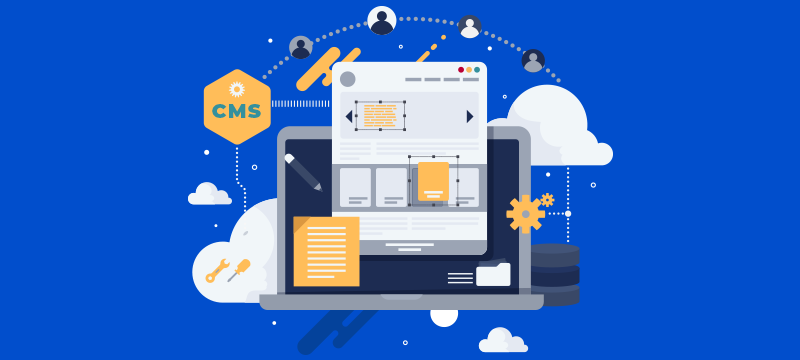Envision a WordPress where AI recommends content ideas, pages load in no time from servers nearer to your audience, and security updates roll out automatically in response to emerging threats. This isn’t science fiction—it’s the future of WordPress. In 2025, the platform is set to embrace leading-edge technologies and practices, transforming how we build and manage our websites.
With WordPress already powering over 40% of the internet, its evolution is important for millions of users. As technology advances, how will WordPress evolve to meet new demands? What trends will influence the way we design, secure, and optimize our sites? With reliable WordPress web hosting playing a crucial role in site performance, 2025 promises to bring changes that could revolutionize WordPress as we know it, from AI-powered tools to enhanced e-commerce capabilities.
Let’s examine in depth the trends that will shape WordPress’s future in 2025 and how they can solve the challenges ahead.
1. AI-Powered Content and Design Automation
AI is revolutionizing WordPress, making content creation, design, and SEO optimization easier. With AI-powered plugins, users can expect real-time content suggestions, optimized headlines, and improved readability, making it simpler to create high-quality content. Additionally, AI tools will allow automated design adjustments, changing website layouts based on user preferences, trends, and past interactions. This will lead to better personalization, as AI analyzes user behavior to serve tailored content, increasing engagement and conversion rates.
2. Effortless Integration of Headless WordPress
Headless WordPress is gaining momentum as it separates the front-end and back-end of a website, offering greater flexibility in how content is presented. This method is becoming progressively popular as businesses embrace omnichannel marketing and seek to create immersive digital experiences across various platforms. By 2025, WordPress developers can look forward to more vigorous tools and APIs designed to simplify the integration of headless WordPress, permitting sites to deliver seamless experiences on mobile apps, IoT devices, amplified reality platforms, and beyond.
3. Advancing Accessibility in WordPress
As awareness and legislation surrounding digital accessibility grow, WordPress is expected to continue ranking accessibility features to ensure inclusivity for all users. In the coming years, we will likely see new core updates and specialized plugins that make it easier for WordPress sites to stay compliant with accessibility standards. Moreover, AI-assisted plugins are expected to become widespread by 2025, offering real-time accessibility audits and suggesting instant fixes to improve usability. These developments will help website owners create more accessible and user-friendly experiences, meeting both supervisory requirements and the needs of diverse audiences.
4. Empowering Users with No-Code Solutions
No-code platforms are changing how websites are built, with WordPress at the forefront. Known for its user-friendly tools, WordPress will continue to evolve, with the Gutenberg block editor allowing more complex customizations without coding. Additionally, visual drag-and-drop builders will make creating custom themes, forms, and pages even easier. These advancements make building professional websites accessible to everyone, regardless of coding skills.
5. Strengthening Security Measures and Privacy Controls
As cybersecurity threats grow, security is becoming WordPress’s main focus. To stay ahead, WordPress is expected to use AI-based tools that can spot unusual activity and automatically apply security fixes or send alerts. With privacy laws like GDPR and CCPA guiding data practices, WordPress will also likely add stronger privacy controls and tools for managing user consent, following a “privacy by design” approach. These improvements will help site owners protect their data and users’ privacy, creating a safer and more secure online environment.
6. E-commerce Growth and WooCommerce Advancements
As online shopping grows, WooCommerce remains the top e-commerce tool for WordPress, set to fortify with advanced features for better shopping experiences. Trends like headless e-commerce will enable faster load times and flexible designs, while AI tools will offer personalized recommendations, sales predictions, and automated inventory management. These updates will make WooCommerce even more powerful for the future of online retail.
7. Expansion of Multilingual and Globalization Capabilities
As businesses target a global audience, the need for multilingual websites is growing. WordPress is likely to improve its multilingual features, adding better translation and currency options or supporting advanced plugins. AI-powered translation tools will also help deliver accurate, culturally adapted translations. These improvements will make WordPress sites more accessible and help businesses reach a wider audience worldwide.
8. Sustainability and Green Hosting Initiatives
As digital sustainability gains importance, WordPress and its hosting partners are expected to adopt eco-friendly practices. Developers will see more energy-efficient themes and plugins that reduce server load and conserve energy. Carbon-neutral hosting solutions will also become more common, supporting WordPress’s commitment to sustainability. These changes will offer eco-conscious users and businesses more environmentally-friendly options.
9. Boost Site Performance with Edge Hosting
As websites become more content-heavy, edge computing will help deliver faster load times by serving content from servers closer to users. WordPress will integrate better with edge computing and CDNs, improving site performance and user experience, which is key for engagement and SEO. These advancements will ensure faster, high-performance sites that meet the needs of a global audience.
Read Also: How to Reduce Initial Server Response Time in WordPress
Conclusion:
From the insights shared in this blog, you must have gained a clear understanding of the exciting trends shaping the future of WordPress. As we move into 2025, the platform is poised to integrate innovative technologies that will redefine how websites are built, managed, and optimized. To stay ahead of these changes, choosing a reliable service like Managed WordPress hosting from bodHOST can provide the performance, security, and scalability your site needs.
Are you ready to harness these trends for your website’s success?
